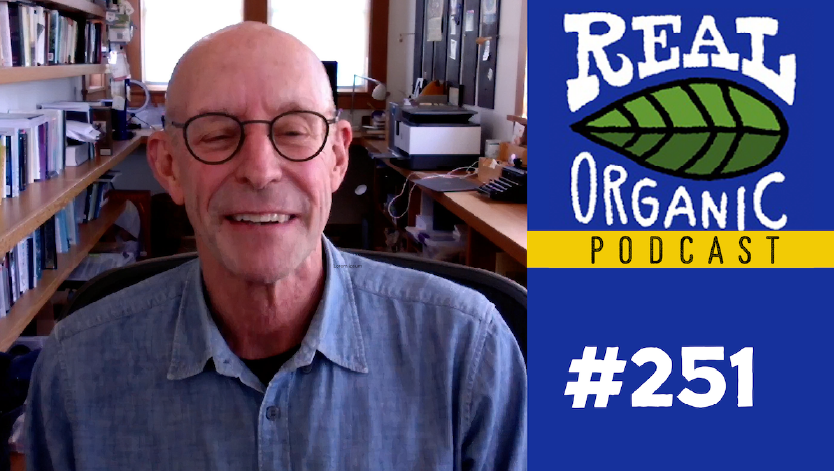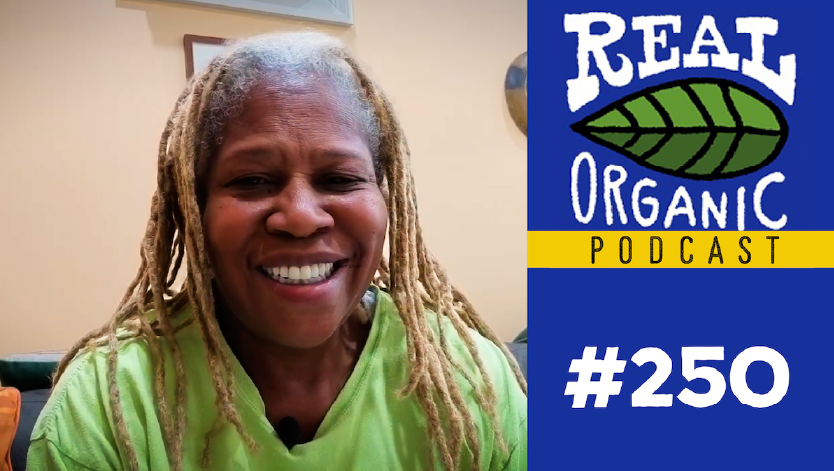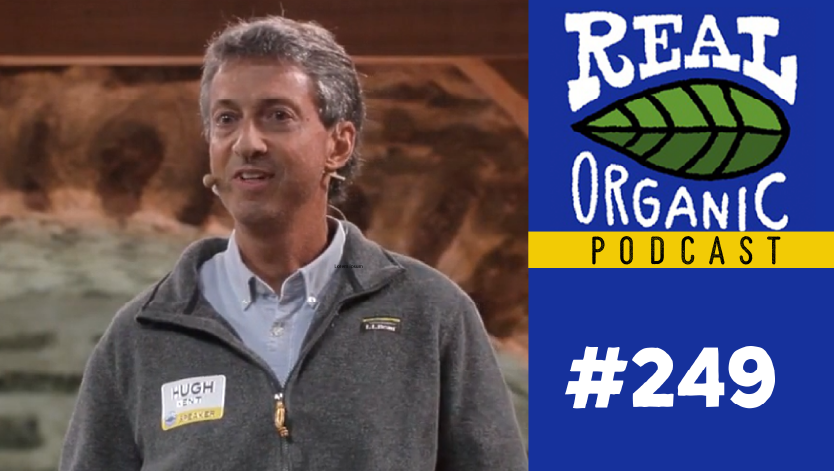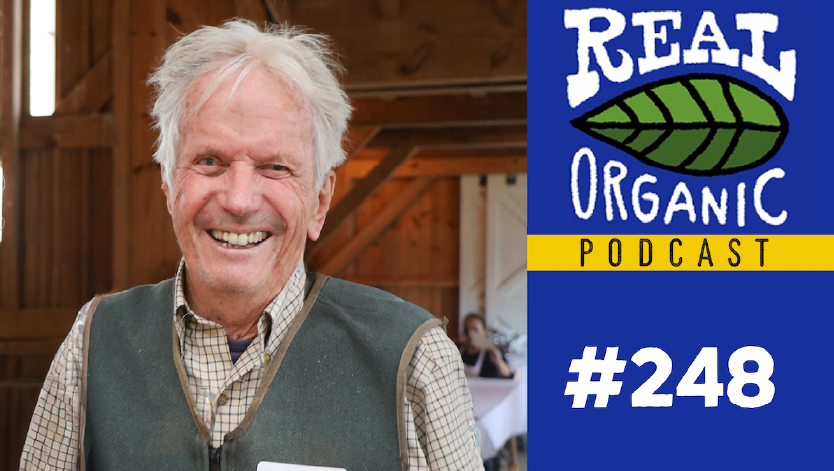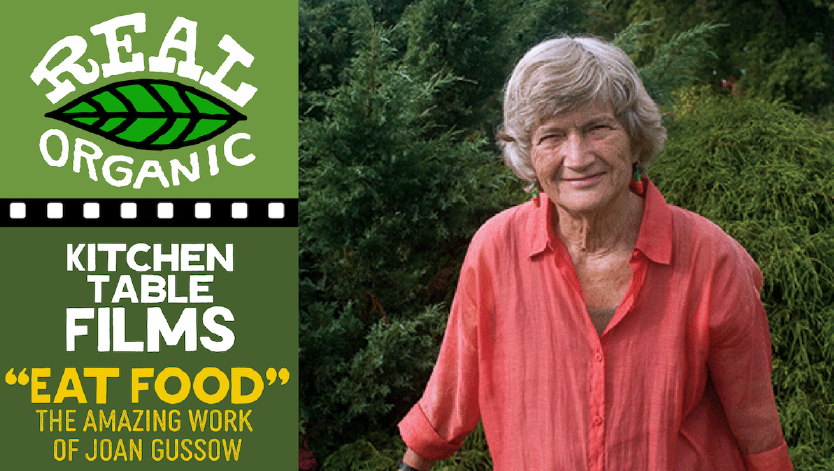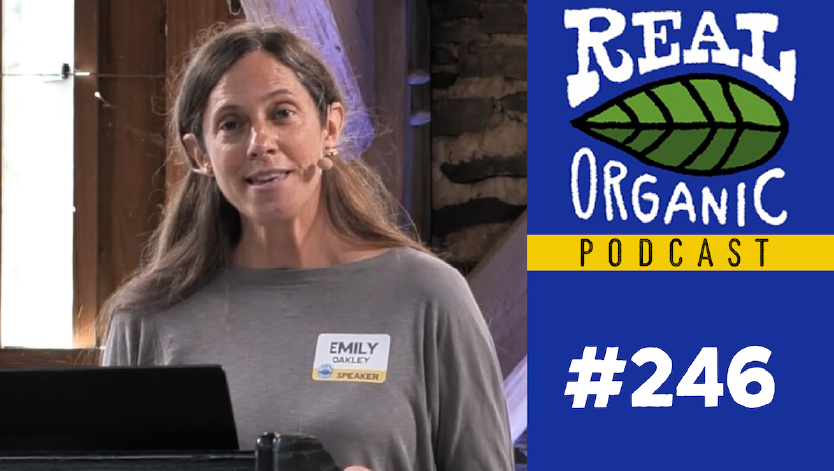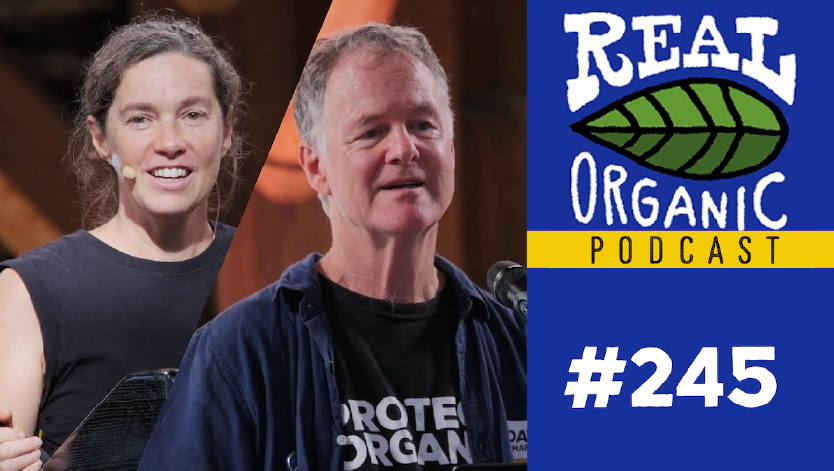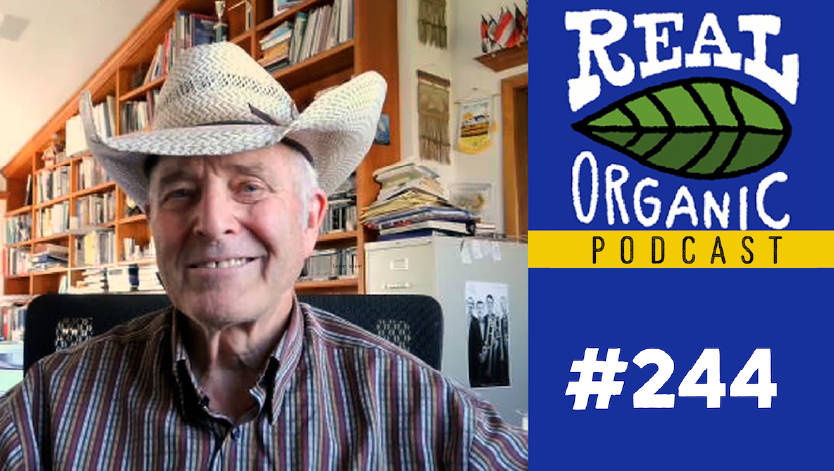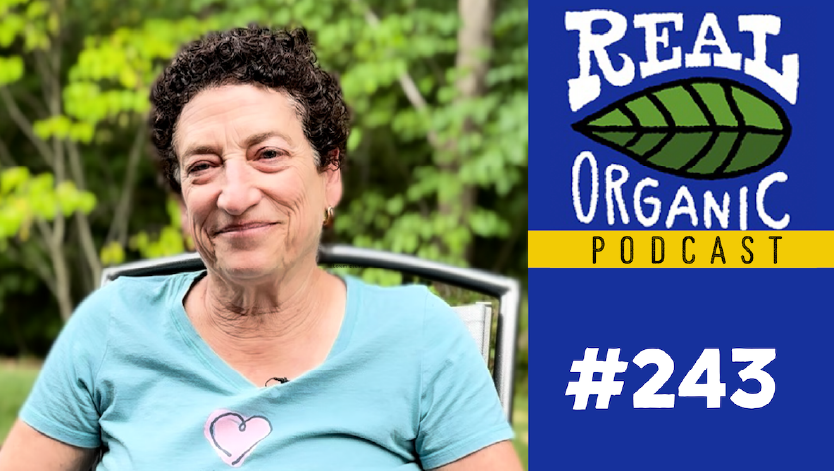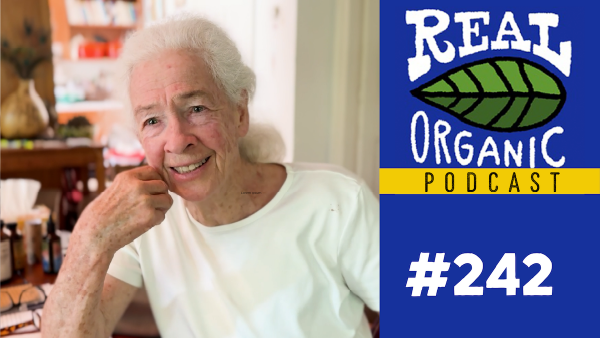Episode #188
Mark Squire: An Early Food Co-op Stays True To Course
Mark Squire, co-owner of Good Earth Natural Foods since 1969, shares his journey through the early organic movement when finding organic rice meant sleeping on sacks stored under his bed. As an influential retailer, Squire helped establish organic integrity by blacklisting fraudulent suppliers and serving on the California Certified Organic Farmers board. Despite industry consolidation pressures, Good Earth thrives by educating consumers and maintaining unwavering standards—even discontinuing their top-selling chips when organic alternatives became available. “When people come to the realization that we really mean it, they literally become customers for life,” explains Squire, championing soil health and transparency in a marketplace increasingly dominated by corporate interests..
Our Mark Squire interview has been edited and condensed for clarity.
Dave Chapman interviews Mark Squire in California,January 2024:
Dave Chapman 0:00
Welcome to The Real Organic Podcast. I’m talking today with Mark Squire. Mark, thank you for taking the time and inviting me to your lovely farm ranch. I guess we call them ranches out here. You got all kinds of livestock. So I’ve actually met Mark before I even wrote a letter about you some time back because I thought that your, your position in the world of independent retailers was significant. And so let’s talk about that. You run, Good Earth.
Mark Squire 0:37
Good Earth Natural Foods.
Dave Chapman 0:39
Natural foods, Good Earth Natural Foods. And the first one was in Mill Valley. No,
Mark Squire 0:43
It was, we were in Fairfax, Fairfax. And our second one was in Mill Valley.
Dave Chapman 0:47
Okay. I’ve been to the one in Mill Valley. I haven’t been to Fairfax,
Mark Squire 0:53
Right. That’s our newer store.
Dave Chapman 0:54
So to me, your stores are very impressive, because they offer eaters, honest choices, genuine choices, so people can decide. And they’re extremely porous to the community, meaning lots of local farms find a space on your shelf. And people looking for that, know that and can come and find it there. And that’s becoming more and more rare. As we as the world keeps changing, and turning. When did you start the first store?
Mark Squire 1:34
Well, it was 1969. And I actually didn’t start it. But I wandered in after they had been open a couple of months. Little hole in the wall. And I had come from Connecticut, I dropped out of school and my 16th birthday. You know, the Vietnam War was raging. And I would just say I wanted to go west. But I think you know, I really got into natural foods because of my mom, who was very she was a student of Adelle Davis, who was a old time nutrition, you know, and she’s
Dave Chapman 2:14
still alive. And she’s still working on it. Are you serious? That’s right. Wow.
Mark Squire 2:19
I had no idea I would have never imagined. But so anyway, I came out.
Dave Chapman 2:26
I take it back. I’m thinking of Francis Morla pay. Oh, so okay, but they can’t be alive. No, but but that was a long time ago that she wrote died for a small planet. Yeah. Yeah. Okay, so Adelle Davis was the one who’s
Mark Squire 2:40
a whole generation before Frances Moore Lappé.
Dave Chapman 2:43
All right. Yeah, my mistake. So she she lit you up? Well,
Mark Squire 2:47
my mom really did. I mean, we used to we grew up eating Oregon needs a lot was one of her big things. So you know, tripe was normal. We even ate brains and kidneys and every part of the animal. Yeah. And a lot of that was it Adelle Davis taught that that’s where the nutrition was in an animal. Right, which I think is still true. Unfortunately, I think we learned later that that’s where a lot of the toxins are to perhaps Right. And, of course, you know, this is the, you know, the 50s. And, you know, probably the animal organs weren’t as toxic back then as they are today. I don’t think I would eat a liver and conventionally grown liver for anything at this point, you know? Yeah. You know, they there might be qualify as toxic weeks waste at this point. But yeah. So anyway, those were sort of my roots. But when I left home, you know, I came across the country and was sort of looking for Well, I’d actually worked in a natural food store in Connecticut after school. And it was really there that I started to read the books that were on their shelf and that was Jay I Rodale, Georgia Sawa. You know, a lot of these sort of early health people. Back to eatin was one of the classics you read and give
Dave Chapman 4:16
me give me a year for other people who maybe weren’t alive then. About what year? Are we talking about that you that you dropped out of school or that you headed west? Was 1969 90 I’m sorry. You said that 1969 That you dropped out or that you headed? Well, I
Mark Squire 4:33
I think early in the year I dropped out. Yeah. Okay.
Dave Chapman 4:37
And so you had been working in natural food store?
Mark Squire 4:41
Yeah. I mean, you know, we actually call them pill shops. Yeah. Then because there was some food there. But there was a lot of mostly it was supplements and, you know, even the organic foods that we you know, one of the things we did before we hit the road coming across the country. We stocked up on food, organic food. And, you know, most of the products that we were buying were Lima, Belgium. So they were literally being imported organic. They were really lovely, you know, oats that just tasted full of flavor from Belgium. But so there wasn’t, there actually wasn’t a whole lot of trade in that, you know, you couldn’t go into any town and even find organic grains. You know, this was actually after I came to California, you know, I got to know the Lindbergh’s and they were really the first rice production in the United States that was organic. And actually, I always tell this story to the Lindbergh people when I meet at the show, because at that point, they were the crop of organic rice was sporadic, and it would always run out. So I had a relationship with Terry Fowler, who’s a distributor who went up and brought Lindbergh rice down for us. And when Terry knew the crop was about to run out, I would sort of buy futures to last me four or five months, sometimes of organic rice. And I didn’t really have any place to store it. So I ended up basically piling it up in my bedroom and putting a piece of plywood on top. And that was my bed. So every, you know, once a month or something, I take one layer of the bed away and put the plywood down and then take it to the store. That was the that’s what you did back then, you know, if you wanted organic food, it was, you know, difficult to keep it,
Dave Chapman 6:49
you had to really hunt, you had to figure it out. Yeah. My memory of slightly later than that was the early food coops, which were not in stores, and they were ordering from Walnut acres and, and wherever we could, and then in somebody’s kitchen, we’d cut up the cheese and weigh out and get, you know, onions, and everyone would get a box, because that’s what you had to do to get organic food. Right?
Mark Squire 7:21
I never was involved. I mean, many of my friends were obviously but you know, when I went into good Earth, it was sort of one of the first you know, what I would consider a natural food store. You know, food was the focus. And so, and organic food from day one was the, you know, the focus. So, but in those days, there weren’t a whole lot of those, even in California, you know, it was, and you had mentioned olm, which was organic merchants, which was very early. You know, I think that that was probably 10 years later. So that’s takes us to maybe 1980. And home was, you know, a network of organic retailers that were trying to ensure the integrity of the industry. And a lot of times I don’t think people really even realize that about organics is that retailers actually played a very important part in those early days of organic of the integrity piece. You know, I had a good friend at Rainbow Grocery in San Francisco, who we thought of them as they’re a co op, but I thought of them as a little bit of a sister store. And stew Fishman was the produce guy there and we used to literally, we go down to Half Moon Bay and do farm visits. You know, we didn’t even call them that at that point. But, you know, there was this artichoke grower that was selling organic, he was always at the farmers market. You know, a lot of people were selling them as organic. And we went down there and just, you know, immediately asked some questions about what what do you do about this or that and it turned out well, he was soaking the root in I can’t remember the material at this point, but it was definitely pesticide good, not good. So and then we just publish that or throw it to the other OEM stores and everybody would blacklist them and and, and there was some really wild things. There was a produce distributor out of LA named Max co Zack who later got busted and it turned out he was literally buying conventional broccoli, taking it out of the box, putting it in a banana box and then shipping it off as organic broccoli. And so it was the way that we you know, early on, in fact, it was really sort of the the retailers doing that was kind of the beginning of certification in a way in that we all realized how important integrity was to you know, the consumer was looking for Anona story And they didn’t want to get burned. And so we, as a group, kind of took that on as like a let’s do what we can to protect it and infected through that later came, both Stewart and I were both part of California certified organic farmers. So I started it was really in Sonoma County here that, well, Sonoma, and then there was a are two chapters Sonoma County, and then there was one down in Santa Cruz. And I ended up just going to a CCF meeting. And, you know, thinking, Well, I’m a retailer, I don’t know, if I’m gonna be accepted in this group, but they immediately sort of embraced me as like, Oh, here’s a guy that, you know, is connected with consumers, you know, we can pick his brain and, you know, anyway, I was welcomed, and ended up being on the board of CCO for five or six years there, as well. But you know, and I think, you know, I’m, I’m a real advocate for the organic label. And some of it is that it gets it gets a bad rap these days. And I sort of understand it, I’m, you know, I’m a critical of, you know, things that go wrong, and organics myself a lot. But at the same time, I think that, especially young people don’t realize how much effort was put into making that label be what it was. And, and it has some real advantages in the marketplace, it helps the consumer to be connected to a method of agriculture that they want to support. And, and it has the built in law behind it, so that if somebody abuses it, you can take them to court, and there have been people that have done jail time now, based on some of that fraudulent activities. And so that’s, that’s a really important, you know, baseline, I think, for our whole community to know that that exists. And, you know, appreciate what the real organic project is doing is to try and, you know, you know, increase the awareness of what soil health really means, and all those things. But, you know, at the same time, I think that soil health was, you know, back in the days of CCF the early days, it was all, you know, Paul Muller was there. And, you know, it was the people with huge integrity that really were making it all happen and influencing the standards. And, you know, we spent, we spent huge amounts of time sitting around tables just sort of deciding, well, you know, how many years does the strawberry start need to be an organic program before you can call it organic, the berries and you know, that kind of detail that people, I don’t think realize how much detail there was to sort of work out. And it was all done within those certification groups before USDA even got in picture. But I always like to tell this story that it was those growers who had huge integrity, you know, about soil health, you know, they had, they were all in it, because they believed in it, you know, none of them. It was so tough back then to make it happen. None of them were there because they wanted to make more money. I guarantee you, but it was within those groups of devoted organic farmers, that the debate emerged. And it mostly emerged around the idea of how long does organic farm have to be organic before you can sell the products is organic. So it was the the entry period was widely, you know, widely debated. And, you know, at that point, it was, there were some certifiers that were kind of going, Oh, that should be a year. Others were saying, three years, I think there was even some people that were saying it should be five years. And, you know, of course, there was there was no data, you know, to look at about pesticide residue breakdown or whatever. And, you know, but the little data that there was sort of showed it was like all over the charts, you know, it depended on soil conditions, climactic conditions, what the pesticide was, there’s just an awful lot there. So there was really kind of no way you could say, well, this is scientifically where the line should be. And
Dave Chapman 14:37
there was no precedent. It’s like, everyone was inventing this making, you know, blazing trails, not following trails. Right. It’s like, okay, well, what what does organic mean to us and we would discuss it, we would argue about it, it was all that was good. Of course, there wouldn’t be agreement. Do you think
Mark Squire 14:59
But let me let me just finish that story is that, but I was. And as a retailer, I was a little bit of a fly on the wall in that conversation because I wasn’t having to deal with the time period, you know, it didn’t influence me economically at all. Whereas these guys, it did. And I felt really sort of humbled and proud in a way that some of those organic farmers that were the most they had the most integrity, the argument that they brought to the table was, we don’t want to make the standards so rigid, that we, that California organic farmers in California farmers can’t transition to organics, because if we had made the cut off five years, it would have been a real niche market that remained. And so the three years would became a compromise position. But But consciously made compromise, that’s kind of you know, what I wanted to
Dave Chapman 16:01
Yeah, I actually, I’m fine with a three year transition. For me the the, the issue, I could live with a one year transition. For me, the real issue is, are we moving America’s agriculture to or get to real organic? Yeah. So if somebody said, Well, something bad happened here two years ago, but that will never happen again. And you know, we’re going to really be invested in a whole kind of agriculture based on life in the soil. Right? Right. I’m like, good, bring it on, bring it on. It’s compromised. It’s always gonna be
Mark Squire 16:40
there’s, you know, I mean, I talk to consumers all the time that can’t believe, you know, I mean, that, you know, pesticides are used in organic and they are sulfur dust or whatever. But, you know, they are pesticides, they’re not anything like the ones that the conventional guys are using, but, but they’re toxins, you know, and some consumers can’t, you know, they can’t even get their head around that. Yeah. You know, and, but, you know, what I what I say to them as well, do you do you want to have stone fruits? At, you know, $3 a pound or do you want to be paying $10 a pound, you know, and I think sometimes there are those trade offs inevitably. But,
Dave Chapman 17:23
yeah. If we, if we step away from the border line, the choices are very simple. The closer we get to the boundary of what the standard is, it gets, it gets complicated. Yeah, no doubt. Yeah, no doubt.
Mark Squire 17:38
And as an industry, I think sometimes we don’t bring a whole lot of logic to those things, too. I wish we did more. Like, you know, we were talking earlier about the plastic mulch thing. To me, I think, I don’t know, if you saw that there was just an article, somebody forwarded it to me, I could send it to you, but basically, about these forever chemicals that are being found on organic farms more than in conventional farms.
Dave Chapman 18:05
What are they from? Well,
Mark Squire 18:07
I think the only, you know, again, it’s one of these sort of tip of the iceberg things where we we need to do a lot more research. But the only thing me and my friends that were talking about it could could guess was that maybe it was about plastic mulch, and which is probably used more in organic systems and conventional, but maybe not. I don’t
Dave Chapman 18:28
know, maybe I don’t know, any conventional farmers who aren’t using plastic mulch. I just don’t in for vegetables. Yeah, of course, you know, dairy field. Rains. Totally different. But everybody is using it. I know, some organic people who won’t. I wonder, are we talking about like pee fast? Yeah. Okay. Well, I suspect that the reason it’s showing up on organic farms is they’re the ones who are testing.
Mark Squire 18:57
What this was an independent thing. You know, in this day and age, you know, you don’t know whether the article originated in Monsanto’s offices, unfortunately, yes, the world we live in, but it did sound like there was some credibility there.
Dave Chapman 19:14
It’s interesting it, it really kind of in the northeast, I really was aware of it first in Maine. And the first farmer who became very famous for this. It wasn’t anything they had done. It was already in the soil before they bought the farm. Oh, yeah. It was from the 50s. The fever acid been right left there in some kind of a sludge residue, something and he had no idea of it. They have no idea where to find Yeah.
Mark Squire 19:42
Well, we live in a messy world. It is. It’s and again, I think you sort of said it there but I think organic I think of as organic is it’s really about healing things. Right? It’s not about being perfect.
Dave Chapman 19:57
Right? Right. I I, I know when they started the organic movement as a movement as a political movement, which would have been in England and Europe, and it came to America, of course, the farming really came from, from India. I mean, that’s where Howard learned, right? A lot of what he ended up teaching. He’s like, Oh, my goodness, these people that I was sent to teach how to farm are teaching me how to farm. But as a political movement, it happened in Europe, because it was really an opposition to the chemical usage that was becoming dominant in the agriculture at the time. And I know that they had conversations about whether they could have standards and certification, there was a lot of doubt about it. And I think that it’s always an imperfect solution. But without it, it’s not good. That’s what we see, at the moment with regenerative are many great people who claim to be regenerative, but they’re also Syngenta. Right. And they, they they embrace Virginia, they have these huge websites about their regenerative practices. And down in the bottom, the last paragraph is, of course, we can permit some chemicals to be used as well, that’s
Mark Squire 21:16
what happens when you have a label that has no legal meaning. Yeah, unfortunately, and I, you know, it’d be nice, it would be really nice if we could somehow establish a higher label, you know, then organic, that had a legal meaning. But honestly, you know, I think even even protecting the label that we have now is a huge challenge moving forward. And, you know, I am very tied into the genetically engineered advance of, of the food system, or fighting against it, at least because, you know, I’m continually shocked at how you know, how much money there is in that industry, and how how sweet the PR is around it, and the that industry, like I, I go to the natural food show, and, you know, they’re showing up on the in the natural food world, with these GMO yeast products, dairy proteins, meat proteins, and, you know, talking to those guys, you can really see that what they really want to do is they want to get into the organic market. And the amount of money they’ve got behind them is huge. And you know, they’re talking in Vilsack ear, constantly. Yeah. And so I That, to me, is my biggest worry. And I think that we, as an industry, we all need to be ready for when, you know, Secretary of Agriculture tries to get that passed into organics, we’re all ready to scream bloody murder, because they will do it. And yeah, I know, you know, it even slips out when you listen to them. Talking sometimes it’ll slip out as like, well, wouldn’t it be nice if we could have GMOs and organics? Are they
Dave Chapman 23:23
Oh, slip it out? I you know, it’s clearly a quiet campaign that’s going on to, to bring in, you know, CRISPR and all those technologies. Yeah. So let me, let me ask you to go back for a minute. So you have the good Earth has has really been successful. Would you say so? Are you you know, are you? Are you being successful? Yes, yeah. And you’ve done that, at a time where most stores that have some similarities to you have actually dropped by the wayside. There is a constant winnowing in the marketplace that shakes out small independent stores in favor of chains, which are then consumed by larger chains, which are then consumed by a larger chain. So we’re getting to a place of consolidation in where people can buy food in America, of actually having very few choices. I mean, you go into stores and it looks like oh my goodness, there’s so many choices. But many of the many of the 1100 farms that are certified with real organic are actually losing those those shelf spaces. Not at your store. Yeah, but at most stores at many stores. What are the what are the main chains in Northern California? I don’t know. Yeah, well, Safeway
Mark Squire 24:56
dominates and Uh, we do have some other rallies is big?
Dave Chapman 25:04
And of course Whole Foods. Whole Foods. Yes, yeah, yeah.
Mark Squire 25:08
We call them Amazon and
Dave Chapman 25:10
Amazon. Yeah, I have a story to tell about about Whole Foods, but we’ll get to that. Why do you think that you have continued to succeed? Are you just an extremely adept business person? No,
Mark Squire 25:26
no, I don’t think so. I mean, I do have to, to qualify things by saying that we’re in the San Francisco Bay Area, which is, you know, World of progressives. And so I think we’ve got a good audience, and we’re also in a fairly affluent area. So those things make it easier to push ahead. But, but that said, I think that a lot of our success is attributed to the fact that we have constantly devoted energy to educating the community about organic issues. So it’s been, you know, you know, me talking at Green Day events, US hosting movies in Senator fell about secret ingredients or, you know, so it’s been pretty constant that we’ve been, you know, because we felt like That was our, you know, that’s what our responsibility was to be good grocers is to help the community to understand food issues. And so and that also is internal, you know, I’m, my hope is you always if you go into good Earth and ask a hard question about organics, you’ll get a really straight answer. And so, and that I think, is coupled with, like you say, we’ve sort of encouraged small farmers, and, you know, when people have the information about, you know, why small farmers do a better job, you know, they want to support them, you know, but it’s the information that I think is frequently lacking. So, so we took that we, you know, we’ve always taken that on and tried to, some of it is, you know, if you go in and, you know, the gentleman that’s putting up Apple displays at Good Earth, you should, you know, you know, if you ask him some question, like, one of the big things that’s being discussed right now is about this appeal stuff, you know, and, you know, if you ask a real, you know, detailed question about something in the world of organics, you’ll actually get an answer from them. And, you know, from that, I think, people started to understand that we were actually a source of information, and they appreciated that a lot, and wanted to support, you know, that kind of transparency. So, I think that’s been a lot of our success. And, you know, you could sort of say the same thing about farmers to is that they’re getting bought out and stuff like that. But to me, it’s more, maybe the question should be, how do we inspire young people to go into business, you know, and, you know, I still look out there at the world, and I see, the world of organic food is a huge business opportunity for people that are committed, and, you know, they, you know, people should open stores, you know, and there are enough of us out there that care about these issues that you will get support. You know, I think, fact I’d say more so than it used to be. You know, when we, when we started out, it was like, you know, I remember, you know, some people would come in and say organic What’s that? You know, it’s like but, right,
Dave Chapman 28:55
we don’t have that almost hostile reaction that we had when we started back in the day. Yeah, I remember well enough. But I, I’d have to say feeling person came to me and said, I’m, what do you think I’m going to do this? I’m gonna start a, a retail operation for organic I go. Be careful, my friend. Because the truth is, you’re now competing with Walmart. You’re not just competing with good Earth. You’re not even just competing with whole foods. Everybody’s got Walmart is the biggest vendor of organic food in America, a certified organic, right. Yeah. And and, you know, as with farmers, I see these programs coming from the USDA, to encourage young people to become organic farmers. Well, wonderful. Yeah. Wonderful. But I also see, very established, very capitalized, very skilled organic farmers going out of business, right, and I go There’s something wrong with the picture, if you think you’re going to encourage these young people who don’t really don’t have the skill set or the financial backing, they don’t have a farm to go in and succeed where these people who’ve been doing it for 20 years are literally failing. I think that we need to change the marketplace. To do that. We need to get the USDA to actually do their job and follow the law. Yeah. and enforce that law. And and if they would do that real organic project could happily go away. And And happily, go away and not do this again. Yeah, yeah. So to do that, I I’ve been convinced at having tried this for some years now that the path of regulatory reform is simply not going to work. We don’t have the power. And we’re going to have to do a lot more that education you’re talking about? Yeah, we have to build a movement. Absolutely. Absolutely. And to do that, we have to explain to people wait, it isn’t quite the way it looks. Which you’re doing. Yeah. Which is why you’re succeeding. Now you’ve got the you’ve got the benefit of already being trusted, and already being established. So it’s, it’s wonderful. And you’re building on that.
Mark Squire 31:17
And, you know, I guess in all honesty, I do have to say that, you know, the first, you know, I would even say the first 10 years of good Earth was, you know, there were some times when I remember, you know, my worst week was when I think I bounced a whole bunch of paychecks on my staff. And it was like, in that moment, I said, I’m never I’m never gonna be back here again, you know, and go do whatever it takes to, to avoid that. But so there were some rough patches. Yeah. And but businesses, businesses that way, and I think, I don’t know, I guess I, I would, I would still encourage young people to get involved in the natural food world. I mean, you can start small and, and learn, you know, you learn and, but i Good Earth is part of the infra independent, atrophied Retailers Association. And, you know, we’re connected with a lot of small retailers around the country. And, you know, so they’re out there, there are people that are working every day, hard to do it. Yeah, I’ve been very vocal in infra, partly because I also think one of the edges that good Earth has is that we’re really committed to organic. So USDA Organic is like our baseline. And customers. You know, sometimes they don’t even necessarily realize it when they walk in the door, but like, I see people occasionally, you know, buying sandwiches at our deli or whatever, and they go, Oh, this is all organic. And it’s, so it sinks in like, oh, okay, these guys really mean what to, you know, mean it. And when, when people come to that realization, they literally become customers for life, you know, and we’ve in the early days, I remember, you know, we used to have people that would, there was, there’s one person that lived way up in northern Sonoma County, so she drive down two hours to do her weekly shop with us, because she realized, oh, I can buy organic here, and they do some, you know, making sure that it really is, and I can trust that. So, you know, there is that devotion that comes with the commitment. And, you know, I think a lot of retailers don’t get that piece of it. But of course, it has to come with the education too. You know, you can’t just be all organic, and leave it at that. But, you know, I can’t tell you how many times at Good Earth, like, you know, a good good example is you know, there’s this brand of chips that are called have a and, you know, they’re very tasty, but when you look at them, they’ve got an ohm sign on them, so they sort of are cool or something, but they’re not organic. So what that probably means is GMO corn and GMO oil and pesticides, etc. But, you know, we, you know, this goes back now 25 years for us, but they were our top selling chip. And because we couldn’t buy there were just weren’t hardly any organic chips out there. But at a certain point, there were enough organic choices in the chip pile that we said, you know, why are we selling those, those guys and so we discontinued them. And it was interesting to watch the, you know, this was probably our like our our You know, number two seller in the whole store, right? So we, before we did it, we, you know, we educated our entire staff like, okay, what are we going to do when people come in the door and say we’re What did you do to with my habit chips? And, you know, we just basically told them the story, you know, we don’t feel like we can, you know, in good conscience sell these to you anymore. And, you know, a lot of people were kind of going, like, oh my god, you know, these guys are crazy, they’re gonna go out of business. But it was actually the absolute opposite that happened, you know, over and over again, you know, moms would come in and say, Oh, really? Wow, thank you for taking good care of us. And that’s why I shop here, you know, almost brings tears to my mind, because I remember those faces. And but you know, when you when you understand what the pesticides on that stuff is doing to your kid, you know, it doesn’t, you’ll go you’ll drive halfway across the country to get the good stuff, you know, and that’s the, that’s where the education has to be right. And there’s a huge following if the education comes with it.
Dave Chapman 36:10
Yeah, that’s right. I agree. That’s what we have to do. And if I were running a small, a small store, that is absolutely what I would do, because I think it’s also your, your competitive advantage over any chain. Right? You care. So, I’ve quoted this a number of times, but I’ll quote it again, I interviewed Michael Pollan. And I asked him, Michael, are things getting better? In the food system? Are they getting worse, because I was genuinely confused about it. And he said, and I probably misquote him, but I’ll do my best. He said, in terms of people’s understanding of the food system, in terms of people’s excitement about alternatives to the food system, it’s just getting better. And we see this tremendous growth in enthusiasm and excitement, and learning. He said, I’ve got, I got students, he was teaching at Harvard, that term, I got students who are riveted by this. And in fact, one of those students came to work on my farm, it was fun. And, but in terms of the realities of the food system, it’s getting worse. Yeah. And we’re using more herbicides. Everything is becoming more consolidated. And that means that they have more political power, and less, and the result is less choice. It’s too much bother to buy it locally, they’re going to find because they’re national in scope, you’re going to find suppliers who can supply them nationally. So I’m curious, I hear that, in this in this, I don’t like to use the word privilege because it has a judgmental connotation. I think it is privileged in the sense of what a privilege to live in a place where everybody should be lived in everyone should live in a place where we need to where they can afford the food. Right. And, and, and, and they’re offered choices. But what do you think, do you as a retailer, are you aware of the pressures of consolidation coming down the pike? In in retail and in distribution? Right.
Mark Squire 38:28
Yeah, that’s a good that’s a really good question. I think yes, but I think I would say that those pressures have always been there. In coming and going, I always remember I you know, for a while I for a while I actually got a little bit involved in the world of certification. I worked for OCA with their international certification part time when good Earth was small, and I I was looking for something else to do a couple of days a week. But and in that, I learned a whole lot about the grain trade in this in North America. And it was really interesting to hear these grain farmers talk about how you know the Cargill ‘s of the world would come into a community open up a grain elevator and offer the farmers you know, 10 15% more for their grain you know, then the the old elevator and as soon as the old elevator went out of business, the price of grain dropped 10% below market to these guys a
Dave Chapman 39:42
classic technique of monopolies. That’s
Mark Squire 39:45
why I call it like hardball. Business. American business is sort of, you know, it’s almost to me, like, you know, where, you know, American business has this tolerance for Yeah, for being abusive and, and cutthroat, you know, and, but, and I think that’s, that’s always been with us in the world of business, too. So, and that’s, I think, you know, but customers want to understand that too, you know, we just, you know, this whole thing just came down with a big kombucha brand where it was discovered that they were basically violating a whole lot of labor laws. And customers really care about that stuff, you know, so, you know, our response was we actually discontinue them. But partly based on the fact that we knew that we knew we have the support of our customers to do that. Because they care, you know, and people do care. So again, it kind of comes, you know, even though social issues come back to awareness and education, I think and to some extent,
Dave Chapman 40:58
yeah. And, and. And being local. You know, that that. I’ve talked before about the Triangle Shirtwaist Factory Fire is a famous fire in New York City. And a lot of people died, because the conditions were terrible. They couldn’t get out the doors were like, jumping out of the windows. And it became a pivotal moment in American labor history and American workers safety. And it was really, you know, OSHA was born that day. Yeah. And, and really, the labor movement. It wasn’t born. But that was the day that it moved to a whole different level, because people in New York City were walking along and seeing bodies lined up on the street. Well, there’s still bodies lined up on the street. They’re just far far away. Yeah. Right. It’s just as dangerous. They just exported the danger, right? To someplace where people don’t look like most Americans, and don’t have a voice. To most Americans with the products are still coming here. We’re wearing them. Right, right. You know, cheap food, cheap, cheap clothing, you know? So, I think that, that storytelling, but that’s, that’s also proximity, when things happen far away out of sight. That’s right, vegetables and berries are moving to Mexico. And that’s because they pay people much less there. And that means that the price goes down here, which means that the domestic producers in California, they’re paying 1515 and a half $16 an hour as a minimum wage can’t compete. Right? So
Mark Squire 42:51
see, but don’t you think the answer to that is worldwide social justice? You know, it’s not putting up a barrier? I don’t think but. But I absolutely do. I always think about like, you know, back in, back when I was a kid, it was like, you know, the, the yogi’s, were coming from India, and there was all this, like, we are all one, remember, we are all one. And it’s to me, it’s like, as I’ve gotten older, I think I’ve realized that there’s, there’s a real truth about that. It’s not at all airy fairy. You know, we are all one and you can’t screw over, you know, people in a third world country without affecting us, too, you know, so we’re all one community even. And so I think that I actually think that, you know, one of the real problems in America is the ignorance of worldwide politics. And, you know, even, you know, I almost can’t talk about social justice issues without talking about the US military budget. It’s, you know, it’s obscene. And I think a lot of the reason for it is to protect that those economic interests, you know, so that the people in third world countries or Southern Hemisphere countries or whatever, don’t, don’t get too uppity about wanting their their labor rights, right. It’s, we can put a dictator in place that’s gonna keep everybody down. And, and we support that, you know, our tax dollars support that. And so, you know, I think we got to, you know, we got to think about, you know, organics and social justice issues on a worldwide level, and, you know, do something about the tax bill, which, you know, to me, it’s like when half your federal dollars go to military budget, there’s a huge problem. Yeah. And there’s no way we’re going to, you know, have the society where Everybody has as much organic food as they want to eat, etc. without shutting that mechanism down. It’s this, you know, corporate corporate greed. Yeah. And, you know, I actually, I think I’ve come to see that the biggest problem on the planet is corporate greed. And you see it in the world of, you know, the military, you see it in the world of the ag industry, you see it in the world of the pharmaceutical industry, it’s all these big businesses that have so much clout in DC, that they can write the laws and, and I think that’s the piece that I think when when the American public really understands that they’re gonna reject that model. And I’m, you know, this is maybe me being a, sometimes I call myself an incurable optimist, but, you know, if we’re going to survive as a race is maybe the more more level headed way to say it, if we’re going to survive as a race, we gotta get that. And we got to, you know, get those guys out of politics, you know, out of running the world and shaping it into something that is really so grotesque. I mean, you know, when when corporations are poisoning our children, you know, it’s time to get get political and get upset, you know, and people are doing, I think people are doing that. That’s what maybe Michael Pollan is speaking of the consciousness that’s increasing, and maybe it hasn’t enough to get people really out on the street, but we have to,
Dave Chapman 46:39
we have to take it to action. You know, but but the, the understanding is growing, you know, people are confused about what to do about it. And I’m confused, too. Yeah, no, this is not obvious. It’s not easy. We have done it before. I mean, this historic moment when we broke up Standard Oil, that was same thing, a hugely powerful company, bigger than anything we’ve got. Yeah. And, and, you know, we had antitrust laws that worked. And we acted on them, we enforce them. Yeah. That’s pretty amazing. So I don’t think it’s naive to think that we might do that.
Mark Squire 47:21
Yeah, yeah. We got to though that’s, that’s where I look at us. If we don’t, we’re screwed, you know? Is it reality, but anyway, yeah, we’ll see what happens. We’ll see what happened. I’m also a real believer in being political. You know, I’ve always, you know, I felt lucky to kind of come from, you know, dinnertime at my, when I was growing up was always debating politics, and, but I do think it’s really important that, you know, people that believe in organic lifestyle, or, you know, meeting their representatives going in there and saying, you know, poisoning my kids with glyphosate is not okay. Please do something about it. Yeah. You know, because they, they need to hear that, you know, whenever I’ve, well, frequently, when I’ve talked to legislators about those issues, they kind of go like, Oh, God, nobody’s ever said that. To me. I mean, it’s it. That’s changing, too, but but they need to hear from us. Yeah, and
Dave Chapman 48:26
yeah, I agree. I agree. Yeah, we need to figure out how to do it together. Because it’s so much more powerful. When we don’t just speak as one voice. That’s where we have to start all with one person at a time, but after a while, it becomes a chorus. And then, and then we can bring some real music to it. Yeah. I want to before we go, I wanted to just tell you a story. Last time, I came to middle Valley. I went to good Earth last year, in August, beginning of August. And before that, I went to Whole Foods and Mill Valley. And it was the height of the local tomato season. And the whole foods did not have a single local organic tomato, in Mill Valley. And of course, voters did. And I thought, How can this be in, as you say, a very privileged clientele of people who are highly educated, have a relatively large disposable income are willing to pay for good food, they understand about health, they understand that what you eat matters. And I went in there and the only certified organic food was a hydroponic tomato from Mexico. And I thought, How can this be? Yeah, I just visited full belly and Scott Park and I’m Jim Durst and all of these excellent tomato growers. and only only your store was selling their stuff?
Mark Squire 50:04
Well, you know, businesses are, you know, very conscious of customer opinion too. So I, you know, I would say like, you know, if, if I heard that from, you know, somebody lived around here, I’d say, Well, you should be in their face and say, Where are local tomatoes? You guys, come on, get out, get on it. But, Chris, when a company gets so big, it’s becomes maybe the person needs to hear that message is in Chicago or something and it gets harder, which speaks to why smaller businesses are a lot of times, you know, more more available and grounded, but
Dave Chapman 50:44
I’m finding that the people in Whole Foods don’t even know who to talk to. They don’t know, who’s making those decisions. It’s so remote now. Yeah.
Mark Squire 50:54
Well, even even I even defend Whole Foods, though, sometimes, you know, if it’s like, if I’m traveling. You know, sometimes, you know, I can buy organic food in there. And that’s, you know, when you look back at, you know, when you go back to those, the 70s and 80s there where it was like, I mean, we literally would look at a map and say, Oh, the next natural food store is, you know, 400 miles that way, let’s, let’s detail her and, you know, stock up a little bit, you know, so, you know, it’s, it’s an you know, if you compare Whole Foods to Safeway, it’s like, no, we need to push we need to push the little Yeah,
Dave Chapman 51:34
yeah. Every level I and and trust me, hopefully, it’s, it’s a big customer of mine. Yeah. And Safeway is not, Walmart is not, you know, all the chains, which have consolidated, consolidated, are not interested in buying anything local, honestly, they just left Whole Foods. Still, will I of course, it’s, it’s, you know, the pain of your child who has gone so far astray. But still, it is. For a chain. It’s the best chain out there. But, and I agree that we need to celebrate the victory that you can go. One friend of mine, a farmer from Georgia, said that she’s so thrilled because, you know, there’s actually she was talking about Walmart, she said, I can go in there, and they’ve got all this organic food now. Now, it’s all industrial organic, right? You know, it’s grown on very big farms. And because they need to ship it to every Walmart in America, but see,
Mark Squire 52:41
wouldn’t it be great if the norm was that, you know, industrial agriculture, organic, everywhere? And that was the floor? Yeah. You know, and, and I think that that’s, you know, that’s not that big of a stretch, you know, you know, sometimes, you know, I hear people kind of be sort of negative about, well, you know, organic food is really not growing that much, and why is it only you know, 5% of the thing, but it’s I think that things grow log more ethically is that we’re lucky Murthy
Dave Chapman 53:18
logarithm, logarithmic log logarithmically, anyway. Yeah.
Mark Squire 53:22
So sometimes it takes I think of it as like, maybe, maybe the industry took a number of years to sort of get the snowball going. Yes. And now it’s worth the point where it’s gonna really start rolling down the hill. And the last thing we want to do is to stop it. Right. Right. And because it should be the norm, that’s every, every mother cares about their kid. And, you know, they’re just brainwashed by the corporate PR, Bs that’s out there. And that’s why they’re not hearing the truth about it. And, but we can break through, you know, and, you know, I’m optimistic that the ball is snowballs rolling.
Dave Chapman 54:06
All right. I’m working on my radical optimism also, it’s my new kind of my, you know, new resolution is I’m going to be dramatically optimistic because I think we actually need the optimism to get there. Yeah, exactly. So okay. But you know, let’s say we will get there and then let’s figure out how, and I
Mark Squire 54:27
you know, I’m I’m also lately I’ve been as things get, you know, I mean, it’s the it’s the global warming thing that you know, it’s bleak news, it’s really bleak news. And so I honestly I’ve little bit shifted to, you know, I do try and embrace the radical optimism but at the same time, there’s also the, well, if we’re going down, let’s go down fighting is the other thing and, you know, to me, that’s another good battle cry.
Dave Chapman 54:57
All right, Mark, square one. Great place to end thank you very much.
Mark Squire 55:02
Yeah, thank you.


